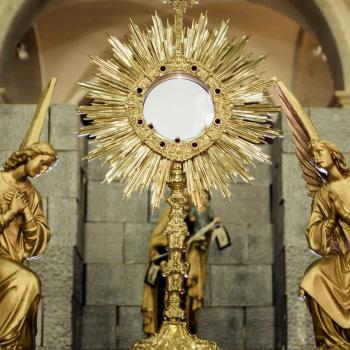Nelson Mandela regularly received Communion from a Catholic priest while he was a prisoner on Robben Island,The Tablet has learnt.
The anti-apartheid campaigner, who died last Thursday, attended Mass and received Communion from a Jesuit chaplain, although he was raised and registered as a Methodist, the provincial of the Jesuits in East Africa said.
Writing in this week’s Tablet, Fr Agbonkhianmeghe E. Orobator commented that has well as benefitting from the services of a Methodist chaplain, “I have reliable information that he also received regular visits from a Jesuit chaplain. According to my source, Mandela used to come to Mass and receive Communion.”
Fr Orobator noted that this “act of intercommunion, given his situation, would be licit under canon law”.
Christians from other denominations are permitted to receive Communion from a Catholic priest if they are unable to get to a Eucharistic service within their own tradition.
Fr Orobator said that while Mandela believed in God, he was not a fan of organised religion, but “like any astute politician, he knew the place of religion in politics and was not averse to using it as much as was necessary”.
“He counted notable religious figures among his friends and relied on the support of a confluence of religious traditions in his spirited and long-drawn struggle to dismantle the apartheid system.”
Can. 844 § 4. If the danger of death is present or if, in the judgment of the diocesan bishop or conference of bishops, some other grave necessity urges it, Catholic ministers administer these same sacraments licitly also to other Christians not having full communion with the Catholic Church, who cannot approach a minister of their own community and who seek such on their own accord, provided that they manifest Catholic faith in respect to these sacraments and are properly disposed.
§5. For the cases mentioned in §§2, 3, and 4, the diocesan bishop or conference of bishops is not to issue general norms except after consultation at least with the local competent authority of the interested non-Catholic Church or community.















